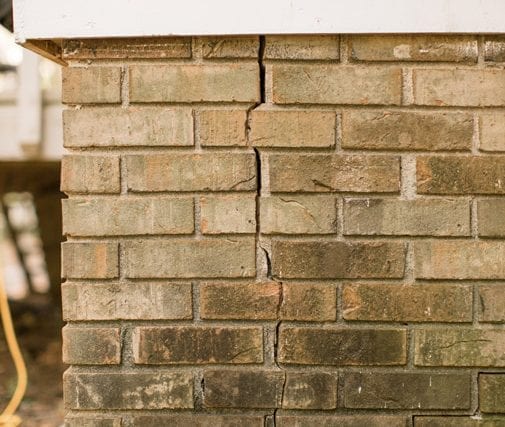
During the winter, many of us enjoy the beauty of snow-covered landscapes. However, beneath the surface, the cold weather can pose a significant threat to our homes’ foundations. Foundation cracks can be a sure sign of foundation damage, and understanding how winter weather contributes to these issues is crucial for proper prevention and repair.
Here are a few ways that cold weather can affect your foundation:
1. Temperature Fluctuations and Foundation Movement
One of the primary culprits behind winter foundation cracks is the constant fluctuation in temperatures, particularly in the surrounding soil. Extreme temperature variations, especially in regions prone to freezing and thawing cycles, can significantly impact a foundation’s stability.
The expansion and contraction of soil due to temperature changes exert pressure on the foundation, leading to cracks over time. This phenomenon is particularly common in colder climates, where the ground freezes and thaws repeatedly during the winter months. The American Society of Civil Engineers estimates that as many as 25% of U.S. homes have suffered some level of damage because of expansive soils, making this a serious concern for many.
2. Frost Heave and Its Impact on Foundations
Frost heave is a geological process wherein soil freezes and expands, causing the ground to lift. This natural occurrence can cause damage to a building’s foundation. According to data from the National Association of Home Builders (NAHB), approximately 80% of foundation damage is attributed to the movement of underlying soils. Frost heave is a major contributor to soil movement. When the soil freezes, it exerts upward pressure on the foundation, which results in cracks and other structural damage. This is referred to as foundation upheaval. Proper insulation and drainage systems can help mitigate the effects of frost heave, but understanding its potential impact is crucial for homeowners in colder climates.
3. Moisture Infiltration and Freeze-Thaw Cycling
Another significant factor contributing to foundation cracks in winter is the presence of moisture. When water infiltrates the soil around a foundation and subsequently freezes, it expands, creating additional pressure on the foundation walls. The volume of frozen water is 9% larger than liquid water, which results in a significant pressure that may overwhelm the strength of the foundation walls. The repetitive cycle of freezing and thawing, known as freeze-thaw cycling, can exacerbate existing cracks and lead to the formation of new ones. Proper drainage systems, including gutters and downspouts, are essential for preventing water accumulation around the foundation.
Preventing Cold-Weather Cracking
Understanding the causes of foundation cracks in winter is the first step toward safeguarding your home. Here are some preventative measures to help homeowners protect their foundations during the cold season:
1. Proper Insulation
Ensure that your home is adequately insulated, including the foundation walls. Talk to your local foundation contractor about foundation and basement insulation, as well as the role that trees, bushes, and other landscaping play in modulating your home’s temperature. Good insulation helps maintain a more consistent temperature, reducing the impact of temperature fluctuations.
2. Effective Drainage Systems
Install and maintain efficient drainage systems, such as French drains, trench drains, sump pumps, gutters, and downspouts, to redirect water away from the foundation. Also, make sure that your land is properly graded for runoff. This helps minimize the risk of moisture infiltration and freeze-thaw cycling.
3. Foundation Inspection
Regularly inspect your home’s foundation for any signs of cracks or damage. If you notice any of the common symptoms of foundation damage such as cracked walls or floors, schedule a professional foundation inspection. Early detection allows for prompt repairs, preventing further damage and more costly repairs. The sooner you address foundation cracks, the better!
Your Trusted Team for Foundation Crack Repair
As winter settles in, the risk of foundation cracks becomes more pronounced. Understanding the impact of temperature fluctuations, frost heave, and moisture infiltration is crucial for homeowners seeking to protect their investments. If you are concerned about cold weather damaging your foundation, get in touch with Virginia Foundation Solutions. Our team can assess your foundation and recommend the most cost-effective foundation and crack repair solutions for your home. Ask for your free inspection today!




